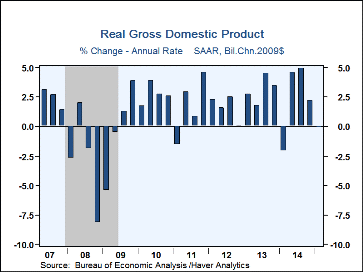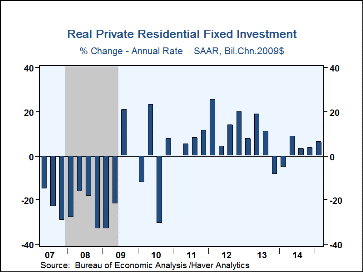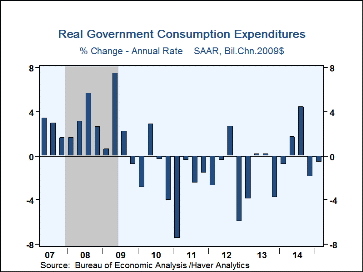 Global| Jun 24 2015
Global| Jun 24 2015U.S. GDP Decline Is Reduced
by:Tom Moeller
|in:Economy in Brief
Summary
Real GDP eased 0.2% last quarter (SAAR), revised from a 0.7% shortfall estimated last month. Business activity suffered last quarter due to severe winter weather and West Coast port closings. It was the third quarterly decline since [...]
Real GDP eased 0.2% last quarter (SAAR), revised from a 0.7% shortfall estimated last month. Business activity suffered last quarter due to severe winter weather and West Coast port closings. It was the third quarterly decline since the economic recovery began late in 2009 and matched expectations in the Action Economics Forecast Survey.
Upward revisions to final demand drove the lessened GDP decline. Domestic final purchases increased at a 1.2% annual rate, revised from 0.8%. Consumer spending rose at a 2.1% rate, revised from 1.8%, but that still was the weakest gain in a year. Business fixed investment declined at a 2.0% rate, revised from -2.8% and government purchases were off at a 0.6% rate, altered from -1.1%. Residential investment increased at an annualized 6.4% rate, revised from 4.9%, and was the strongest rise in three quarters.
Inventory accumulation added 0.5 percentage points to growth, revised from 0.3 points. It followed two straight quarters of subtraction from growth. Trade deficit deterioration subtracted an unrevised 1.9 percentage points as exports declined at a 5.8% rate (+3.4% y/y), the first decline in a year. Imports rose at a 7.1% rate (6.8% y/y).
The GDP price index was little changed, about as previously estimated. The personal spending price index fell at an unrevised 2.0% rate but the index excluding food and energy rose at a 0.8% rate. The business fixed investment price index eased at a 0.1% rate, the first decline since 2010. The 0.3% decline in the residential price index was the first since 2012.
Corporate profits without IVA & CCA rebounded 2.9% (9.0% y/y), about as earlier estimated, following a 3.0% decline in Q4'14. Profits after inventory and capital consumption adjustments fell 5.2% (+4.5% y/y) reflecting a lessened 6.1% shortfall (+9.3% y/y) in nonfinancial sector earnings. Profits earned abroad fell a deepened 7.7% (-13.1% y/y) while financial sector earnings slipped a little revised 0.5% (+8.3% y/y).
The latest GDP figures can be found in Haver's USECON and USNA databases; USNA contains basically all of the Bureau of Economic Analysis' detail in the national accounts, including the integrated economic accounts and the recently added GDP data for U.S. Territories. The Action Economics consensus estimates can be found in AS1REPNA.
Regional vs. Global: How Are Countries' Business Cycles Moving Together These Days? from the Federal Reserve Bank of St. Louis is available here.
| Chained 2009 $, %, AR | Q1'15 (3rd Estimate) | Q1'15 (2nd Estimate) | Q1'15 (Advance Estimate) | Q4'14 | Q3'14 | Q1 Y/Y | 2014 | 2013 | 2012 |
|---|---|---|---|---|---|---|---|---|---|
| Gross Domestic Product | -0.2 | -0.7 | 0.2 | 2.2 | 5.0 | 2.9 | 2.4 | 2.2 | 2.3 |
| Inventory Effect | 0.5 | 0.3 | 0.7 | -0.1 | -0.0 | 0.0 | 0.1 | 0.0 | 0.1 |
| Final Sales | -0.6 | -1.1 | -0.5 | 2.2 | 5.0 | 2.9 | 2.3 | 2.2 | 2.2 |
| Foreign Trade Effect | -1.9 | -1.9 | -1.3 | -1.0 | 0.8 | -0.6 | -0.1 | 0.3 | 0.1 |
| Domestic Final Sales | 1.2 | 0.8 | 0.7 | 3.3 | 4.1 | 3.0 | 2.4 | 1.9 | 2.1 |
| Demand Components | |||||||||
| Personal Consumption Expenditures | 2.1 | 1.8 | 1.9 | 4.4 | 3.1 | 3. 1 | 2.5 | 2.4 | 1.8 |
| Business Fixed Investment | -2.0 | -2.8 | -3.4 | 4.7 | 8.9 | 5.2 | 6.3 | 3.0 | 7.2 |
| Residential Investment | 6.4 | 4.9 | 1.3 | 3.8 | 3.3 | 5.5 | 1.6 | 11.9 | 13.5 |
| Government Spending | -0.6 | -1.1 | -0.8 | -1.9 | 4.4 | 0.9 | -0.2 | -2.0 | -1.4 |
| Chain-Type Price Index | |||||||||
| GDP | -0.0 | -0.1 | -0.1 | 0.1 | 1.4 | 0.9 | 1.5 | 1.5 | 1.8 |
| Personal Consumption Expenditures | -2.0 | -2.0 | -2.0 | -0.4 | 1.2 | 0.3 | 1.3 | 1.2 | 1.8 |
| Less Food/Energy | 0.8 | 0.8 | 0.9 | 1.1 | 1.4 | 1.3 | 1.4 | 1.3 | 1.8 |
Tom Moeller
AuthorMore in Author Profile »Prior to joining Haver Analytics in 2000, Mr. Moeller worked as the Economist at Chancellor Capital Management from 1985 to 1999. There, he developed comprehensive economic forecasts and interpreted economic data for equity and fixed income portfolio managers. Also at Chancellor, Mr. Moeller worked as an equity analyst and was responsible for researching and rating companies in the economically sensitive automobile and housing industries for investment in Chancellor’s equity portfolio. Prior to joining Chancellor, Mr. Moeller was an Economist at Citibank from 1979 to 1984. He also analyzed pricing behavior in the metals industry for the Council on Wage and Price Stability in Washington, D.C. In 1999, Mr. Moeller received the award for most accurate forecast from the Forecasters' Club of New York. From 1990 to 1992 he was President of the New York Association for Business Economists. Mr. Moeller earned an M.B.A. in Finance from Fordham University, where he graduated in 1987. He holds a Bachelor of Arts in Economics from George Washington University.












